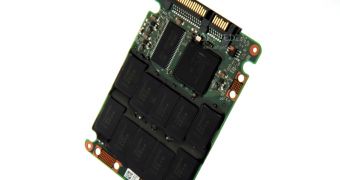The Solid State Drive industry is moving at an accelerated pace, with new players joining the market as new technologies provide them with an option to develop faster, more efficient and more affordable SSDs. Intel is one of the industry's innovators, having already launched two generations of SSDs, designed for either the consumer or the business segment. On that note, the Santa Clara, California-based chip maker is said to be preparing for the launch of its next-generation of Flash-based storage solutions, which could debut by the end of next year.
According to a recent article on Fudzilla, the world's leading chip maker is looking to provide users with its next-generation SSDs, which are scheduled to debut sometime in the fourth quarter of 2010. As it goes with unconfirmed products, there is limited information regarding the specifications and details of the upcoming SSDs. However, the aforementioned source suggests that the upcoming release is codenamed Postville Refresh and will be manufactured at a process smaller than 34nm, available with the company's current line of SSDs.
With the introduction of a manufacturing process smaller than 34nm, Intel could provide users with new SSDs that can go up to 600GB, the article suggests. While no confirmed details are available on the manufacturing process, there's a good chance that Intel is currently working with 28nm, although the upcoming SSDs might also use a process smaller than that. There are no performance details available, but you can suspect that these new drives will deliver a performance boost, compared to the chip maker's current line.
Although these are only rumors, one can speculate that the Q4 2010-bound Intel SSDs might adopt the new SATA 3 interface, which should further enhance performance and deliver faster transfer speeds. We can only hope that, the improved manufacturing process will also enable Intel to lower the prices of the new SSDs.

 14 DAY TRIAL //
14 DAY TRIAL //